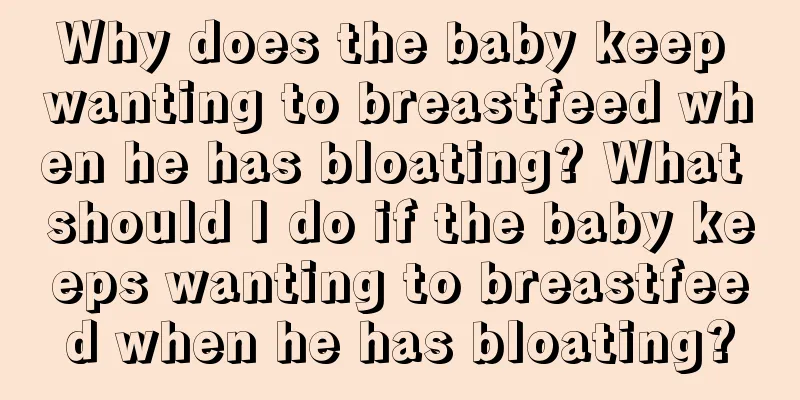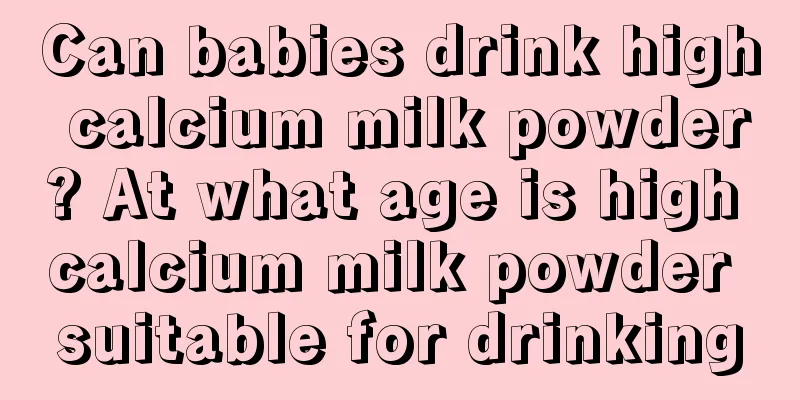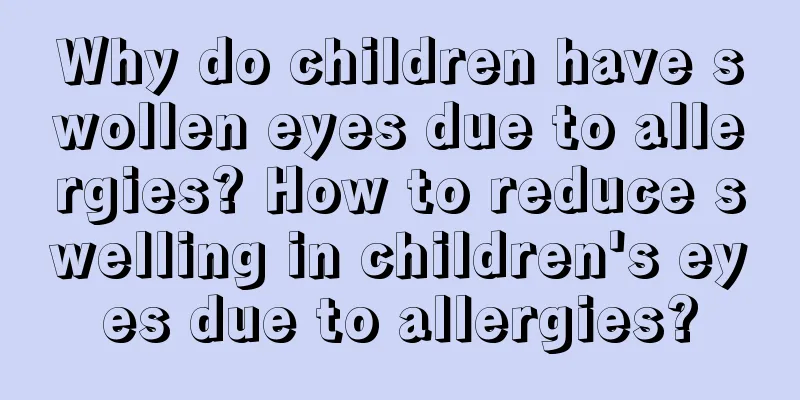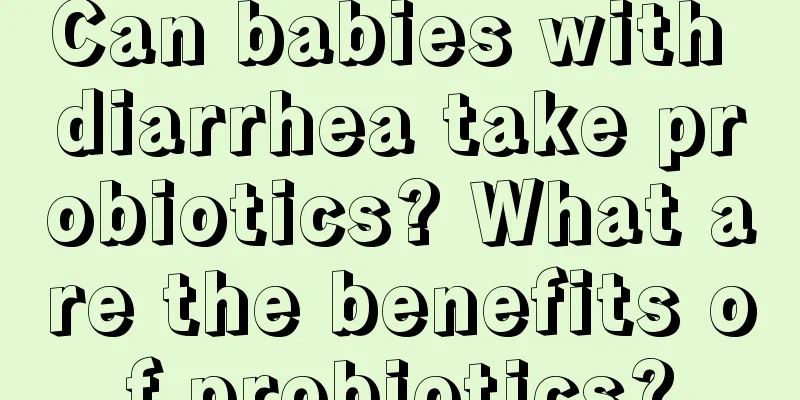Why does the baby keep wanting to breastfeed when he has bloating? What should I do if the baby keeps wanting to breastfeed when he has bloating?

|
The stomach and intestines of babies who have just been born are very fragile, and they often have flatulence. This is a normal phenomenon, and different babies have different physical constitutions, so the symptoms are also different. So let's find out why babies keep wanting to breastfeed when they have flatulence. What should I do if my baby keeps wanting to breastfeed when he has flatulence? Why does the baby keep feeding when he is bloated?The manifestation of bloating in each baby is different. Some babies have big tempers and are impatient. When they don't get to eat when they want to, they will cry to express their dissatisfaction. It is possible that the baby is not full. Parents can touch it. If the baby's stomach is abnormally swollen, they need to seek medical attention in time. They can also cover the baby's abdomen with a warm towel to help gastrointestinal motility and exhaust, and improve digestion and absorption functions. Nutritionally balanced diet If breast milk contains too much sugar and the sugar is over-fermented in the baby's stomach, the baby is also prone to intestinal flatulence. Mothers should pay attention to limiting sugar intake. Letting children lie on their stomachs more often can also relieve intestinal flatulence. The baby's flatulence may be caused by excessive gas production in the intestines, or it may be caused by crying and swallowing too much gas. Regardless of the cause, the child will feel uncomfortable in the abdomen when bloating, which will increase crying, and sucking can comfort the child. What should I do if my baby keeps wanting to breastfeed despite being bloated?If the baby does not cry or make a fuss, and does not show any other uncomfortable symptoms, do not worry too much, as it may be caused by intestinal bloating. In this case, parents can rub their hands to warm them up and gently place them on the baby's belly and massage them for a while, which will have a certain relief effect. If the baby's belly is still bloated after massaging the belly, you can try giving the baby some probiotics to regulate the baby's stomach. Remember to control the water temperature when flushing probiotics, and do not make it too hot, otherwise it will destroy the activity of the probiotics. If the baby has a bloated belly and is accompanied by symptoms such as crying, nausea, and vomiting, take the baby to the hospital for a detailed examination immediately. This may be caused by gastrointestinal problems and requires symptomatic treatment. Why does the baby stop crying when I hold him when he is flatulent?Babies cry as soon as they are put down, but stop crying when they are picked up. This is often due to the following reasons: 1. The baby is uncomfortable in the stomach. The younger the baby is, the weaker the baby's digestive function is. They often have intestinal flatulence. The small stomach will be swollen and bulging. Sometimes they will spit up milk, burp, and pass a lot of gas. However, the baby does not know how to express it. His face will turn red and he will kick his legs randomly. If the baby does not get better at this time, he will have to cry and cry loudly to attract the attention of his family, who will then pick him up. When the baby is held, he feels restrained, and part of the air in the stomach is squeezed out to help exhaust gas. The bloating will be relieved and the baby will feel comfortable. If the baby is put on the bed, this sense of comfort will disappear, and the baby will cry again. 2. When the baby is held, he feels warm and soft around him, which makes him feel safe. Therefore, the baby cries when he is put down, but stops crying when he is held, and he likes to be held upright. Why can't the baby's flatulence be discharged?Try to avoid eating foods that easily cause flatulence. For breastfed babies, if the child's symptoms are still intermittent during the mother's diet, it means that breast milk is not the cause of the child's flatulence. But if the mother's flatulence is alleviated after the mother's diet, then the mother should stay away from those flatulent foods. If the child is fed with formula milk, you can try to change to another brand of milk powder. If the child does not absorb lactose, then when choosing milk powder, pay special attention to the nutritional formula of the milk powder on the outer packaging, and try to choose a lactose-free, soy-free or low-allergenic formula milk powder. Of course, changing milk powder may not be immediate, and it takes about two weeks to see the effect. |
Recommend
Can Black Toothpaste remove acne? How long is the shelf life of Black Toothpaste?
Black toothpaste is not very effective in removin...
What tests are needed before artificial insemination? When is artificial insemination?
Artificial insemination is the process of injecti...
Can Shuke toothpaste whiten teeth? Can Shuke toothpaste be used for a long time?
Shuke toothpaste has many series, and each differ...
How to regulate your body during pregnancy preparation? How to increase the chance of pregnancy during pregnancy preparation
Now more and more people are beginning to advocat...
Can warm breast milk that has not been consumed be put back into the refrigerator? Why is it not recommended to heat breast milk with hot water?
Storing breast milk sounds simple, but there is a...
What causes zinc deficiency in babies? Pay attention to these 8 aspects
When the baby has a loss of appetite, is picky ab...
Causes of excessive or insufficient amniotic fluid and mortality from amniotic fluid embolism
Amniotic fluid is an important shelter for the gr...
Is it normal for premature babies to speak late? What should I do if my premature baby speaks late?
Usually premature babies lag behind full-term bab...
How to calculate the due date of pregnant women most accurately
Pregnant mothers always look forward to meeting t...
What is the most accurate method for diagnosing early pregnancy?
Unexpected pregnancy is a concern for many women,...
Can pregnant women eat black olives? Who can't eat black olives?
Black olives are a type of olive, but they are di...
What should babies not eat with shrimp? Precautions for babies to eat shrimp
What should babies not eat with shrimp? Shrimp is...
How to prevent your baby from being picky eaters? Here are 5 tips
The baby is in the process of physical developmen...
Can babies eat mushroom fruit?
Can babies eat mushroom fruit? Mushroom is an unc...
Where is the most cost-effective place to travel during the summer vacation? Where is the cheapest place to travel during the summer vacation of 2017?
Many parents are wondering where to travel cheapl...









